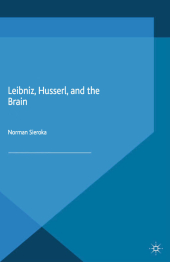 Neuerscheinungen 2015Stand: 2020-02-01 |
Schnellsuche
ISBN/Stichwort/Autor
|
Herderstraße 10
10625 Berlin
Tel.: 030 315 714 16
Fax 030 315 714 14
info@buchspektrum.de |

N. Sieroka
Leibniz, Husserl and the Brain
1st ed. 2015. 2015. xiii, 314 S. 216 mm
Verlag/Jahr: SPRINGER PALGRAVE MACMILLAN; PALGRAVE MACMILLAN UK 2015
ISBN: 1-349-49797-5 (1349497975)
Neue ISBN: 978-1-349-49797-3 (9781349497973)
Preis und Lieferzeit: Bitte klicken
This book is about structural relations between phenomenological and neurophysiological aspects of consciousness and time. Focusing on auditory perception and making new and updated use of Leibniz and Husserl, it investigates the transition from unconscious to conscious states, especially with regard to the constitution of phenomenal time.
PART I: INTRODUCTION 1. Summary and Scope 1.1. Summary of Content 1.2. Relevance and Contribution to Contemporary Philosophy 2. Methodology: Re-Thinking Leibniz and Husserl 2.1. Gaining Orientation by Re-thinking Leibniz 2.2. Extrapolations, Syntactic Metaphors, and Explications 2.3. Phenomenology of (Unconscious?) Perception 2.4. Non-propositionality of (Subliminal) Perception PART II: PERCEPTION 3. Leibniz on Unconscious Perception 3.1. Monads and their Perceptual Activity 3.2. Leibniz on Perception as ´Expression´ 3.3. Leibniz on Unnoticeable and Unnoticed Perception 3.4. Appetites, Volition, and Freedom 4. Recent (Empirical) Support for a Leibnizian Approach 4.1. Contemporary Evidence for Unconscious Perception 4.2. Leibniz´s Principles of Physics and Perception 4.3. Corroboration of the Pre-established Harmony 4.4. Case Study: a Leibnizian Interpretation of Libet´s Experiment 5. From Unconscious to Conscious Perception Following Leibniz 5.1. Transitions in Perception: Analogies from Exact Science 5.2. A Threshold in Distinctness 5.3. Leibniz on Attention, Apperception, and Reflection PART III: INTERMEZZO 6. Auditory Perception and Time 6.1. Manifestations of Sounds and their Expressive Relationships 6.2. Hearing (and) Time on Different Scales PART IV: TIME 7. Phenomenological Re-Assessments of Leibniz 7.1. Intentionality, Adumbrations, Moments, and Intuition 7.2. Simple Reflection and Immediate Memory 8. A Leibniz-Husserlian Approach on Time Consciousness 8.1. Husserl on Time Consciousness 8.2. Relations to Leibniz´s Approach 8.3. Repercussions between Phenomenology and Neuroscience 9. Perceptual Time and Physical Time: Expression Instead of Reduction 9.1. Minds, Bodies, Persons 9.2. Tensed and Tenseless Orders of Time 9.3. Phenomenal Physical Time? Naturalized Perceptual Time? 9.4. Temporal Orders Expressing Each Other
"Sieroka has developed a kind of empirically-informed Husserlian-Leibnizian parallelist account of perceptual and physiological phenomena. ... he develops his views with great rigor, and in many passages brings to bear his perspective on current debates, attesting to the current relevance of his account. The book is very clearly written, rendering the Leibnizian and Husserlian views accessible to a broad philosophical and scientific readership, and providing a framework to organize one´s thoughts on the topics of perception and time." (Kristjan Laasik, Phenomenological Reviews, reviews.ophen.org, December, 2015)
Norman Sieroka received a Ph.D. in Physics from the University of Heidelberg, Germany, working in auditory research and on the neurophysiology of time perception. He earned an M.Phil. in History and Philosophy of Science from the University of Cambridge, and both a Ph.D. and Habilitation in Philosophy at the ETH Zurich, where he is currently employed as a senior researcher.


